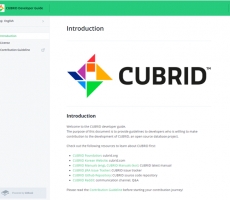-
Read More

CUBRID Internal: Storage Management (Disk Manager, File Manager)
Written by Jaeeun, Kim on 08/11/2021 Introduction Database, just as its name implies, it needs spaces to store data. CUBRID, the open source DBMS that operates for the operating system allocates as much space as needed from the operating system and uses it efficiently as needed. In this article, we will talk about how CUBRID internally manages the storage to store data in the persistent storage device. Through this article, we hope developers can access the open source database CUBRID more easily. - The content of this article is based on version 10.2.0-7094ba. (However, it seems to be no difference in the latest develop branch, 11.0.0-c83e33. ) CUBRID Storage Management The CUBRID server has multiple modules that operate and manage data complexly and sophisticatedly. Among them, there are ... -
Read More

CUBRID License Model
Written by Charis Chau on 06/08/2020 Why Licenses Matter? Open source licenses allow software to be freely used, modified, and shared. Choosing a DBMS with suitable licenses could save the development cost of your application or the Total Cost of Ownership (TCO) for your company. Choosing a DBMS without a proper license, you might find yourself situate in a legal grey area! CUBRID Licenses Unlike other open source DBMS vendors, CUBRID is solely under open source license instead of having a dual license in both commercial license and open source license. Which means that for you, it is not mandatory to purchase a license or annual subscription; company/organizational users can achieve the saving from Total Cost of Ownership (TCO). Since CUBRID has been open source DBMS from 2008,... -
Read More

CUBRID's Development Culture: The Development Process and Improvements Behind
Written by Hyung-Gyu, Ryoo on 07/16/2021 Foreword Hello, I am Hyung-Gyu Ryoo, I am working in CUBRID as a research engineer in the R&D department. In this post, I would like to introduce the development process of the open source project CUBRID and the efforts we have made to improve the process. It has been almost two and a half years since I joined CUBRID. During this period, as many great fellow developers have joined the CUBRID community, the R&D department of CUBRID has grown from one small team to three developments teams along with a QA team. After I participated in the first major version release (CUBRID 11), I was able to look back to the release process and improve the development process with my fellow developers. The Development Process of the Open Source Data... -
Read More

Contributing to Open Source Community/Project
Written by Charis Chau on 06/23/2020 What is an open source project? To answer this, let us start with a burger! Imagine an open source project is a burger selling in a restaurant. Every day, the chef makes thousands of burgers that have the same quality by following the same recipe from the restaurant. One day, customer A comes to the burger place to try the burger, and he/she loves it! Therefore, customer A decides to ask the chef whether he/she can get the recipe. Here, if the restaurant is open source, they will be happy to share the recipe to customer A, vice versa. After customer A gets the receipt, he/she decide to make the burger at home by him/herself! However, customer A is a meat lover and does not like onion that much, so he/she decide to change the recipe by taking o... -
Read More

Converting PL/SQL to CUBRID Java SP using ANTLR and StringTemplate
Written by Youngjin Joo on 09/30/2021 CUBRID DBMS (hereinafter 'CUBRID') does not support PL/SQL. If you want to continue your project by creating functions or subprograms with PL/SQL syntax in CUBRID, you need to convert them to Java Stored Function/Procedure (hereinafter 'Java SP'). Database developers, administrators, and engineers are often familiar with PL/SQL syntax but not with programming languages. In addition, application development depends very little on the DBMS used, but converting PL/SQL to Java SP seems difficult because it feels like you're developing a new system. Therefore, while I am looking for an easy way to convert PL/SQL to Java SP, I found out about ANTLR. ANTLR is a tool for generating parsers. With the help of contributors around the world, ANT...



